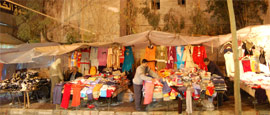Located within the old city walls, Souk al-Hamidiyeh is Damascus's most famous souk (market). Built in stages during the Ottoman era - the eastern section in 1780 and the western section in 1883 - the souk has undergone numerous renovations, but it retains its old-world charm. You can find traditional Syrian silver and gold jewellery, and intricately carved wooden furniture. Be prepared to bargain.
Things to see in Damascus
Tourist offices
Address: Cham Palace Hotel, Damascus, Syria
www.syriatourism.org
Straight Street, the Via Recta, has been the main east-west thoroughfare since Roman/Hellenistic times. Just off the street are the grand Damascene houses of the Christian Quarter, now often turned into bars and restaurants. At the end is the Roman gate of Bab Sharqi, and nearby the underground Chapel of St Ananias, where it is believed that Ananias sheltered St Paul after his blinding conversion. St Paul's Chapel marks the spot where St Paul was lowered over the city walls to escape his Roman persecutors.
Some 5km (3 miles) of walls surround the well-preserved medieval city of Damascus, with the Great Umayyad Mosque at its heart. It is a place for strolling through the labyrinthine alleys and busy souks, admiring the fine palaces, madrasas (Quranic schools), caravanserais and mosques on the way, or whiling time away in one of the many cafés.
The Maristan Nur ad-Din, a 12th-century lunatic asylum, was used until the 19th century. Patients were soothed by music and the splashing waters of fountains. Now an interesting museum of medicine, it shows just how advanced the Arabs were on that front.
This exquisite mosque was commissioned by the Ottoman Sultan Sulayman the Magnificent and built by his master architect Sinan in a mixed Turkish and Syrian style. Next door is a tekke or monastery, now strangely filled with army planes from the Army Museum, and the Selimiye Madrasa, a centre for traditional crafts.
The splendid early eighth-century Umayyad Mosque was built on a site that has been sacred for thousands of years. It has been an Aramaic temple, a Roman temple and a Byzantine cathedral. The shrine, said to contain St John the Baptist's head, is still an important pilgrimage spot, as is the tomb of Salah ad-Din (Saladin) just outside the courtyard. More than 12,000 workmen helped to create the superb golden mosaics that once surrounded the entire courtyard, but only the Paradise Panel is left, representing paradise, or Damascus itself.
The museum has many treasures from Syria's amazing archaeological sites. Highlights include the sculpture and jewellery from Palmyra, the second-century interior of the Dura Europos synagogue, the world's first alphabet on the Ugarit tablets and the eerie priest statues of Mari.
One of the most beautiful palaces of the old city, the 18th-century palace of the Ottoman governor Assad Pasha al-Azem has several rooms illustrating traditional crafts and culture.
Do you have any Feedback about this page?
© 2026 Columbus Travel Media Ltd. All rights reserved. No part of this site may be reproduced without our written permission, click here for information on Columbus Content Solutions.








 You know where
You know where